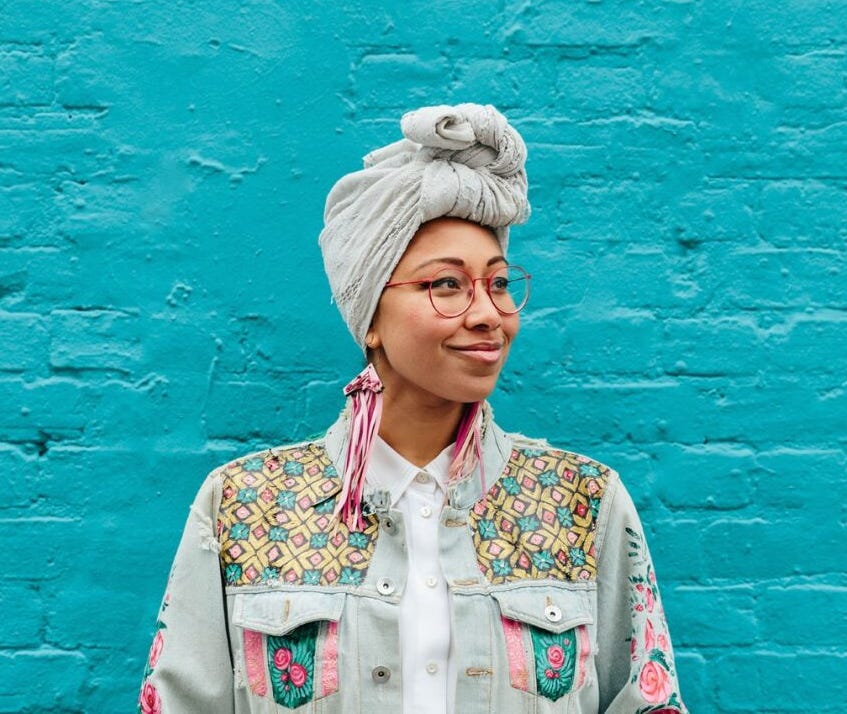Yassmin Abdel-Magied On Fatphobia
A guest post from writer, broadcaster and advocate Yassmin Abdel-Magied
Photo of Yassmin Abdel-Magied
We’re trying something new with this edition, throwing the spotlight on leaders who inspire us in the way they challenge the status quo. Today’s spotlight is on Yassmin Abdel-Magied a Sudanese diaspora author, screenwriter and award-winning social advocate. A former mechanical engineer, Yassmin has published five books, including essay collection Talking About A Revolution (PRH, 2022) and two novels for younger readers, You Must Be Layla (Puffin, 2020) and the award-winning Listen, Layla (Puffin, 2021). Her TED talk has been viewed over 2.5 million times and recognised as one of TED’s top 10 ideas.
In this edition:
Yassmin Abdel-Magied On Fatphobia
If you like what you read, forward this to a friend. This post originally appeared on Yassmin’s Substack Good Chat: subscribe to it here.
Many years ago, as a teenager coming into my politics, a fellow volunteer confided in me after an event. We had been in conversation about the discrimination faced in the workplace, and while I can’t remember the exact context, I can recall with surreal clarity the exact moment this volunteer leaned in close, eyes darting to check everybody else had left the room, and whispered:
‘I know it’s not the same as being African, or Muslim, but I do think there’s discrimination against people who are…’
They did not say the word ‘fat’, but that was the clear implication.
It was the first open, honest dialogue I’d had about discrimination against fat people in my life. Until that point, fatness - even in my non-Western, Sudanese family - came with all the pejoratives you can imagine, and I had accepted them as fact. As we talked, I remember being struck by the shame thickening the air, as if the mere acknowledgement of a fatness was somehow ignoble, humiliating —
The texture of this shame was nothing like that of being racialised, gendered, or anything like I had experienced in conversations around disability, etc before. This was a moral shame, swooping in and blocking out the sun, chiding us with darkness and shadow. You do not deserve light, the shame seemed to say.
Reader, this shame was not ours.
While I have thought about discrimination, individual and structural, against fat people for years, this might be the first time I’m writing about it. I’ve been lurking on the margins of the ‘body positivity’ movement, observing, learning, trying to understand my place among the fray, teasing out the best way to be most useful, working on my own internalised demons. I read Hunger by Roxane Gay in one sitting as soon as it was released in 2017, entranced and moved by her scalpel sharp honesty. I’ve inhaled article after article on how doctors fat shame, fatphobia’s impact on women in the public sphere, why the issue is structural and systemic, how fat-shaming is on the rebound.
But I’d (halal) wager that you don’t need articles to know what I’m talking about: According to the Harvard department of psychology, body size is the only form of unconscious bias that is actually increasing. This Guardian piece also notes ‘conscious bias towards larger people was found to be decreasing the most slowly of any of the categories investigated’.
So what’s the deal? Why bring this up now? What are the structural and systemic aspects of this, and what should we even be doing about it?
By chance this week, I picked up Kate Manne’s new book: Unshrinking: How to Fight Fatphobia. (Interestingly, the US cover says How to FACE Fatphobia instead).
Manne’s book builds on the work of many before her, including Sole-Smith, Roxane Gay, Aubrey Gordon and Da’Shaun L. Harrison. She uses her personal experience as an entry point, then branches out into structural analysis, while also asking philosophical questions like ‘is it a moral obligation to be thin?’ (turns out there are few philosophers who are not white men and reed-thin).
The book is not a panacea, but it does a great job of puncturing innumerable myths (conflation of fatness and sickness, fatness and desire, the racist history of fatphobia, etc). It also talks about the impacts; according to Manne there is about a $40,000 annual average wage gap between a very thin millennial woman and a very fat millennial woman. Doesn’t that fill you with rage? It reminded me of last year’s Economist special on the ‘economics of thinness’ which noted ‘it appears to be economically rational for women to pursue being thin.’ Wild.
Some of the reviews of the book are downright fatphobic in their response, with one critic describing Unshrinking as ‘absurd, self-deluded’ and a ‘super-processed sausage of identity politics and fat activism’ with ‘no curiosity about why people binge eat’. Yikes.
If you don’t have time to read the whole book, check out this conversation with Manne on NPR for a flavour of some of the ideas in the book.
I have no neat conclusion today, dear readers, only the urge to say that if we believe in a world that is safe and fair for all, we should all work on tackling the fatphobia that is embedded into our worlds, pushing back on it when we see it and challenging the stories we tell ourselves.
To learn more about Yassmin head to her website, subscribe to her Substack and follow her on social media where she shares social commentary and regular updates on her work.
Our Next Event
Join our free virtual workshop all about how to plan and reach your career goals. Listen as our founder & CEO Abadesi shares success strategies that have helped her pursue her ambitions in a male-dominated industry. You can register here: tell all the women you love to come along, too!
New Techish Podcast
This Tuesday catch a fresh episode of Techish podcast as Abadesi and Michael dig into the hottest stories in tech and pop culture.
Free Resources
Want to get in touch?
Schedule a call with Benjy Kusi, Head of Learning & Development here
Follow us on LinkedIn, Instagram, X (Twitter), YouTube
Thanks for reading all the way to the end, here’s something fun ICYMI: Last week over 20,000 Black techies descended on Houston for Blavity’s annual Afrotech conference: Blavity CEO Morgan DeBaun paired up with HBO Insecure’s Yvonne Orji to show off both of their bestselling books.





